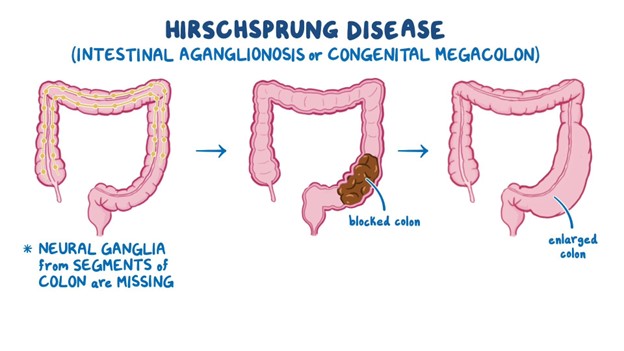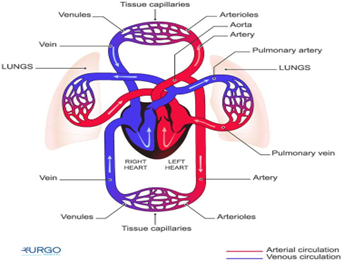A nurse is providing teaching to a parent of a child who has Hirschsprung disease is scheduled for initial surgery. Which of the following statements by the parent indicates an understanding of the teaching?
"I'm glad my child will have normal bowel movements now.
"I want to learn how to use my child's feeding tube as soon as possible
"I'm glad that my child's ostomy is only temporary
I want to learn how to empty my child's urinary catheter bag
The Correct Answer is C
Hirschsprung disease is a condition where nerve cells are missing from parts of the intestine, leading to problems with bowel movements. The treatment for Hirschsprung disease often involves surgery to remove the affected portion of the bowel and create a temporary ostomy (stoma). An ostomy is an opening in the abdominal wall through which waste material can pass into an external pouch, bypassing the affected section of the intestine.
The correct statement by the parent that indicates an understanding of the teaching is C. The parent is expressing relief that the ostomy is temporary, meaning it is not a permanent situation. This response indicates that the parent has been informed about the nature of the ostomy and its planned duration, which is an essential aspect of preoperative teaching.
Let's go through the other options and explain why they are not the best choices:
A. "I'm glad my child will have normal bowel movements now." This statement is not accurate because, after the initial surgery with the creation of a temporary ostomy, the child will not have normal bowel movements. The ostomy is created to bypass the affected part of the intestine, and the child's bowel movements will be directed through the ostomy until further surgery is performed to reconnect the intestine.
B. "I want to learn how to use my child's feeding tube as soon as possible." While learning how to use a feeding tube may be relevant for certain medical conditions, it is not specifically related to Hirschsprung disease or the planned initial surgery. Hirschsprung disease primarily affects the bowel and its function, not the child's ability to eat.
D. "I want to learn how to empty my child's urinary catheter bag." Hirschsprung disease does not directly impact the urinary system, so there is no specific reason for the parent to learn how to empty a urinary catheter bag in the context of this condition or the planned surgery.

Nursing Test Bank
Naxlex Comprehensive Predictor Exams
Related Questions
Correct Answer is B
Explanation
Following a cardiac catheterization, the nurse should provide the parent with appropriate discharge instructions to ensure the child's proper recovery. The correct instruction to include is option B: "Give the child acetaminophen for discomfort."
Explanation:
Option A: Offering the child clear liquids for the first 24 hours is not a typical instruction following a cardiac catheterization. After the procedure, the child may be allowed to resume a regular diet, as tolerated, based on the healthcare provider's orders.
Option B: This is the correct instruction. After cardiac catheterization, the child may experience some discomfort at the insertion site or the area where the catheter was threaded through the blood vessels. Acetaminophen can be used to manage mild pain or discomfort.
Option C: Taking a tub bath for the first 3 days is not typically mentioned in discharge instructions after a cardiac catheterization. The nurse might advise the parent to avoid submerging the catheter insertion site in water for a specific period and instead use sponge baths until permitted by the healthcare provider.
Option D: Keeping the child home for 1 week is not a standard recommendation for a cardiac catheterization. The recovery period after a cardiac catheterization is usually shorter, and the child can often resume normal activities within a day or two, depending on the specific circumstances of the procedure and the child's condition.
The nurse should thoroughly review the specific discharge instructions provided by the healthcare provider and ensure the parent understands the care required at home, including any restrictions on activities or signs of potential complications that require immediate attention.
Correct Answer is C
Explanation
A. Gastrointestinal:
Kawasaki disease primarily affects blood vessels, and the gastrointestinal system is not the main target of this condition. While gastrointestinal symptoms can occur as part of the overall inflammatory response, such as abdominal pain, vomiting, or diarrhea, they are not the primary focus of concern in Kawasaki disease. The most critical system to monitor in Kawasaki disease is the cardiovascular system, specifically the coronary arteries.
B. Respiratory:
The respiratory system is not the primary system affected by Kawasaki disease. While respiratory symptoms can occur as part of the overall inflammatory response and fever associated with the disease, such as coughing or runny nose, they are not the main concern in Kawasaki disease. The primary system to monitor in this condition is the cardiovascular system, especially the coronary arteries.
C. Cardiovascular:
This is the correct answer. Kawasaki disease is primarily a vasculitis (inflammation of blood vessels) that affects various blood vessels, including the coronary arteries. The inflammation of the coronary arteries can lead to coronary artery aneurysms and other cardiac complications. Monitoring the cardiovascular system is essential to detect any signs of coronary artery involvement and ensure timely intervention to prevent potential long-term cardiac problems.
D. Integumentary:
The integumentary system (skin) is not the primary focus of Kawasaki disease. While some skin changes can occur during the acute phase of the disease, such as a rash or peeling skin on the hands and feet, these are not the primary concerns. Monitoring the cardiovascular system is critical in Kawasaki disease due to the risk of coronary artery inflammation and potential complications.

Whether you are a student looking to ace your exams or a practicing nurse seeking to enhance your expertise , our nursing education contents will empower you with the confidence and competence to make a difference in the lives of patients and become a respected leader in the healthcare field.
Visit Naxlex, invest in your future and unlock endless possibilities with our unparalleled nursing education contents today
Report Wrong Answer on the Current Question
Do you disagree with the answer? If yes, what is your expected answer? Explain.
Kindly be descriptive with the issue you are facing.
